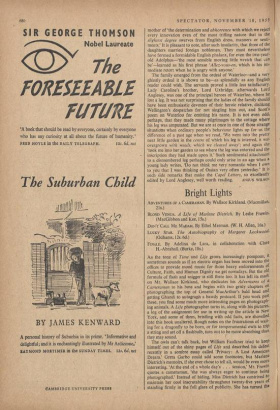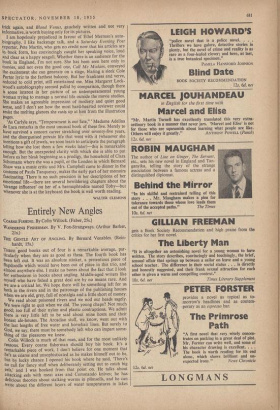Bright Lights
DON'T CALL ME MADAM. By Ethel Merman. (W. H. Allen, 16s.) LUCKY STAR. The Autobiography of Margaret Lockwood. (Odhams, 12s. 6d.) As the tone of Time and Life grows increasingly pompous, it sometimes sounds as if an electric organ has been moved into the offices to provide mood music for those heavy endorsements Of Culture, Faith, and Human Dignity we get nowadays. But the old formula of flash and snigger is still there too. It has left its mark on Mr. Wallace Kirkland, who dedicates his Adventures of Cameraman to his boss and begins with two grisly chapters on photographing the top of General MacArthur's bald head and getting Cihandi to autograph a bawdy postcard. If you work past these, you find some much more interesting pages on photograph- ing animals. A Life photographer turns in, along with his pictures, a log of the assignment for use in writing up the article in New York, and some of them, bristling with odd facts, are shovelled into this book unaltered. Rough notes on the frustrations of wait- ing for a dragonfly to be born, or for temperamental owls to trip a string and set off a flashbulb, turn out to be more absorbing than they may sound.
The owls can't talk back, but William Faulkner tried to keep himself out of the shiny pages of Life and described his defeat recently in a sombre essay called 'Privacy: A Lost American Dream.' Greta Garbo could add some footnotes, but Marlene Dietrich's memoirs, if she ever chose to tell all, would be even more interesting. 'At the end of a whole day's . . . session,' Mr. Frewin quotes a cameraman, 'she was always eager to continue being photographed.' Instead of hiding, Miss Dietrich has contrived to maintain her cool inscrutability throughout twenty-five years of standing firmly in the full glare of publicity. She has turned the trick again, and Blond Venus, gauchely written and not very informative, is worth buying only for its pictures.
I, am hopelessly prejudiced in favour of Ethel Merman's auto- biography. I like backstage talk, and a Saturday Evening Post reporter, Pete Martin, who gets no credit now that his articles are In book form, has convincingly caught her speaking voice, loud and clear as a happy seagull. Whether there is an audience for the book in England, I'm not sure. She has been seen here only in Movies, and not even the good one, Call Mc Madam, conveyed the excitement she can generate on a stage, blaring a sleek Cole Porter lyric to the farthest balcony. But her frankness and verve, reduced to cold print, still entertained me. Miss Margaret Lock- wood's autobiography seemed pallid by comparison, though there Is some interest in her picture of an untemperamental young woman trying to manage a normal life outside the movie studios. She makes an agreeable impression of modesty and quiet good sense, and I don't see how the most hard-hearted reviewer could resist the melting glances she casts up at him from the illustration Pages.
'As Carlyle says, "Temperament is our fate,"' Madame Adelina de Lara remarks in the most unusual book of these five. Merely to have survived a concert career stretching over seventy-five years, and the disorganised private life that went with it (whenever she mentions a gift of jewels, we soon learn to anticipate the paragraph telling how she lost them a few weeks later)—this is remarkable enough. But the unexpected clarity with which she is able to put before us her bleak beginning as a prodigy, the household of Clara Schumann where she was a pupil, or the London in which Bernard Shaw was a music critic and Mrs. Campbell came to dinner in the costume of Paula Tanqueray, makes the early part of her memoirs fascinating. There is no such precision in her descriptions of her emotional life—there are several bewildering chapters about the strange influence' on her of a hermaphrodite named Toby—but Whenever she is at the keyboard the book is well worth reading.
WALTER CLEMONS











































































 Previous page
Previous page